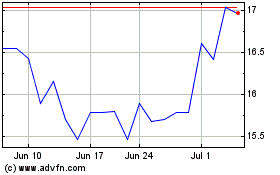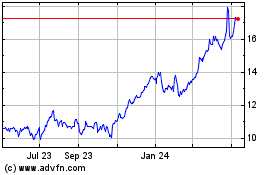Deutsche Bank Deal Talks With Commerzbank Break Down -- Update
April 25 2019 - 5:25AM
Dow Jones News
By Ben Dummett and Jenny Strasburg
Banking giant Deutsche Bank AG and its crosstown rival
Commerzbank AG Thursday ended merger talks, leaving in tatters the
German government's hope to shore up both banks and create a
banking powerhouse.
The failure to unite the two ailing lenders is likely to unleash
fresh attempts by other banks to scoop up one or both of the banks,
a process that could spur the biggest reshuffling of European
banking assets since the financial crisis.
"After careful analysis it became apparent that such a
combination would not be in the interests of either bank's
shareholders or other stakeholders," Commerzbank said.
After years of flirting with a tie-up, the banks for the first
time announced last month they were in formal merger talks. They
were both under pressure from investors and the German government
to find a way to revive themselves after years of slumping
performance and overhauls.
A deal offered the potential to drastically slash costs by
cutting tens of thousands of jobs and lower funding costs for
troubled Deutsche Bank through access to the direct government
shareholding and added retail deposit base of Commerzbank.
In the end, Deutsche Bank and Commerzbank couldn't come to terms
on how to overcome both the challenges of integrating the banks'
technology, back-offices and other operations -- a process that
would take years to complete -- and the dilution shareholders faced
from any deal.
Without a deal, both banks face myriad challenges, though
Commerzbank is seen by many investors as the steadier of the two.
Since 2016, it has cut staff and narrowed its focus to
deposit-taking and commercial lending. That's helped Commerzbank
boost its customer base as well as loan volume for German midsize
companies.
Those steps have also helped make it a potential target of
non-German rivals. UniCredit SpA, which has a sizable German
banking unit of its own, has indicated it would look at bidding for
Commerzbank should the Deutsche Bank talks fail, according to a
person close to the Italian bank. Investors and analysts figure
that other likely bidders could include the eurozone's other
largest banks, such a BNP Paribas, Banco Santander SA and ING
Groep.
Deutsche Bank, on the other hand, could face a fraught future
alone. It is far more dependent on trading and investment banking
businesses, has lost market share to its U.S. rivals in core areas
and suffered from higher funding costs than many of its
competitors. In a sign of investor skepticism, its stock price
trades at just a third of its stated book value.
Some investors and analysts have said Deutsche Bank needs to
pare back or pull out of investment-banking businesses that lose
money, with or without a merger.
Deutsche Bank has explored options to reshape various pieces of
the bank, including creating a so-called bad bank to house impaired
and unwanted assets and businesses that could be earmarked for
closure.
Officials with its asset-management arm, DWS, have discussed a
potential deal to combine with Swiss rival UBS AG's asset
management business, among other options, according to people
familiar with the matter. Such a deal would likely see Deutsche
Bank remain DWS's biggest shareholder with a goal of growing the
merged entity, with UBS owning a stake. DWS already is publicly
traded, providing shares for currency in such a deal.
The talks aren't exclusive or guaranteed to result in a deal,
and timing of any potential agreement is uncertain, according to a
person close to the matter.
Both banks will remain challenged by the eurozone's negative
interest rates, which suppress net-interest margins, or the
difference between what banks pay to depositors and what they
receive from borrowers. They also face a hyper competitive market
in Germany, which is home to almost 1,600 banks and none with any
major market share advantages.
Collapse of the talks represents a blow to the German
government, both as a 15% shareholder of Commerzbank and in its
efforts to create a stronger, combined bank to help fund growth of
the country's industrial base both at home and abroad amid worries
of an economic slowdown.
Officials in Germany's finance ministry have maintained that it
was the banks' decision on whether it makes sense to do a deal.
Still, the potential of creating a European champion to compete
with stronger foreign institutions in banking and other industries
fueled the finance ministry's support of a deal, The Wall Street
Journal has reported.
Deutsche and Commerzbank had been reluctant to enter into merger
talks but took the plunge after receiving crucial support from the
German government that it wouldn't stand in the way of preventing
the tens of thousands of domestic jobs cuts that would have
resulted from any deal.
Patricia Kowsmann contributed to this article.
Write to Ben Dummett at ben.dummett@wsj.com and Jenny Strasburg
at jenny.strasburg@wsj.com
(END) Dow Jones Newswires
April 25, 2019 05:10 ET (09:10 GMT)
Copyright (c) 2019 Dow Jones & Company, Inc.
Deutsche Bank Aktiengese... (NYSE:DB)
Historical Stock Chart
From Mar 2024 to Apr 2024

Deutsche Bank Aktiengese... (NYSE:DB)
Historical Stock Chart
From Apr 2023 to Apr 2024
